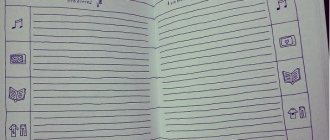Why do you need to keep a personal diary?
Writing down thoughts and things that happened to you is quite a useful practice. Many people underestimate this. People do not spend enough time and attention to reflect on their lives, various moments, memories and experiences.
It's worth writing down everything that happens to you every day. This will help you become much more aware of where you are making mistakes. In addition, such personal journaling will help you understand your life much better and concentrate on your personal experiences.
Use pen and paper
The modern world is all about keyboards and touch screens. But when it comes to journaling, regular pen and paper have more advantages.
I find that most of my patients intuitively understand that writing down thoughts by hand is more effective than using a keyboard. And research confirms this. It turns out that while writing, the reticular activating system is stimulated - the area of the brain that filters and brings to the fore the information on which we focus.
Maud Purcell
Writing by hand has additional benefits. This keeps us from editing our own thoughts. Although many people in their 20s and 30s have lost the muscle memory of handwriting and may find it slow and awkward, it won't be long before you feel comfortable writing by hand again.
When I can convince young people, especially 20-year-olds, to take good old-fashioned note-taking, they are always amazed at the results because it really calms them down and helps them cope with problems.
Maud Purcell
What should you write down?
Psychologists say that in your personal diary you need to write down all the important events and incidents that concern your life. You need to write down all your experiences and thoughts.
The Central Bank named the regions of Russia with the most expensive and cheapest mortgages
“I don’t depend on men”: Sofia Ernst about her success
Why is it so difficult to learn to ask for help and how to overcome fear
You can think about it or remember it later. Over time, you will realize how important these entries in your personal diary can be.
If you don't like writing with a pen, find a suitable tool for you
Perhaps, after trying to write by hand, you will realize that this option is not suitable for you. There's nothing wrong with that.
Luckily, there are a huge variety of options available today. Personally, I prefer to journal by hand using the V5 Hi-Techpoint pen, which has a very thin tip. Yes, only this specific option. I think it's the perfect tool to help my thoughts flow from my head to the pages of my Moleskine notebook.
But, if paper and pen are not for you, turn to their technological counterparts. Both standard editors (Word from Microsoft or Pages from Apple) and more minimalistic solutions like Ommwriter are suitable. Perhaps you prefer touch screens. In general, look for the most convenient solution for yourself.
How does journaling help?
Keeping a personal journal helps you become much more aware of your feelings about the things and events you are going through. You can at any time return to those events that happened earlier in your life and compare what you thought about these things at that time and how you feel about them now.
There are many benefits to revisiting all your memories and gaining invaluable experience in life. When you write about something in your journal, you hope that you will eventually return to it to learn something new.
In addition, if you wish, you can let other people read your personal diary, for example, your spouse or children, so that they learn more about your life, about mistakes and try not to make them. This will help them in solving life problems. Plus, they will be able to understand you much better.
Modern youth will never understand these moments from Soviet films
Mini braids: quick simple hairstyles for a walk or remote work
Why did ancestors in the old days dream of good weather on Forgiveness Sunday?
Details
Think about a time in the past when something unpleasant happened to you that caused you extreme anger, pain, sadness, guilt, or fear. How often do you think about this event? Do you experience the whole gamut of negative emotions all over again? Or are you sure that “everything is fine and everything is for the better”? The answer “yes” to any of these questions says: most likely, your psyche did not process the experience correctly. Now try to describe what happened and express all your feelings on paper. You will probably feel relief afterwards.
At least that's how journaling affected participants in a study on expressive writing.
- a method that involves presenting a traumatic event in free form, with an emphasis on describing emotions. Volunteers with depression wrote about painful events from their past in diaries. The experiment lasted only three days, but the participants spent as much as 20 minutes on the diary every day. Depression was then measured with two tests: the Beck Inventory and the PHQ-9. The symptoms softened significantly - and a month after the experiment they remained at the same level. But the control group, which described neutral everyday events, did not improve.
There are more than 200 similar studies. Back in 1986, the author of the expressive writing method, psychologist James Pennebaker, began to conduct them. Later, his colleagues took up the initiative. The experiments are small, from 40 to 100 participants, and most often short-lived, 3-4 days. Apparently, otherwise they would cost too much. But they were made qualitatively, with a control group for comparison, so the conclusions can be trusted.
Most research on expressive writing has focused on mental health.
. They found that when subjects journaled about pain, anger, and anxiety, their levels of the stress hormone cortisol decreased and they experienced fewer symptoms of stress and depression. People also fall asleep faster if they journal before bed.
Shouldn't describing the negative, on the contrary, strengthen it?
Why do we feel less anxious when we are immersed in negative emotions? At first Pennebaker explained the paradox this way. People tend to suppress traumatic memories, and in writing they express emotions - and it becomes easier. But everything turned out to be more complicated. Writing simultaneously gives meaning to the experience, helps regulate emotions, and encourages you to talk about the experience with other people and seek support from them. Even when scattered memories form a story, this intellectual process breaks out of the vicious circle of obsessive thoughts.
Expressive writing also affects cognitive abilities. Three days of writing about traumatic events in a diary is enough to improve working and autobiographical
memory
- for 5-7 weeks [, ] or even six months. Emotionless descriptions do not give such an effect. The explanation is as follows. The more fragmented our understanding of a stressful event, the more cognitive resources we spend on it. By describing it, we form a more coherent narrative. Result: we stop constantly thinking about what happened, and spend the saved energy on other information.
What about physical health?
Expressive writing also improves physical health.
Not at the time of writing and not immediately after: at first, blood pressure even rises. But if you continue to write, then visits to the doctor become less frequent, and the pressure decreases. Scientists have also found that journaling about stress and trauma alleviates symptoms of asthma, rheumatoid arthritis, fibromyalgia and irritable bowel syndrome and speeds recovery after a biopsy. There is even evidence that expressing negative feelings in a diary is good for the immune system [, , ] and makes vaccination more effective.
Apparently, this is because the body and mind are more connected than they seem. Post-traumatic stress, for example, is not just constant anxiety, but elevated cortisol levels. High cortisol increases blood pressure and levels of cholesterol, triglycerides and blood sugar, and with them the risk of heart disease.
What if, on the contrary, you write good things in your diary?
Classic expressive writing immerses a person in traumatic experiences and negative emotions. But there is positive expressive writing
, which instructs you to write down in your diary all the good things that happen in your life. This method is also good for mental health. In one study, for example, anxious participants described pleasant events three days a week. After a month of keeping a diary, anxiety and depression decreased. When the participants were tested two months later, they still felt better.
A different mechanism is at work here. By describing negative experiences, we make sense of them and free the mind. When describing the positive, we switch attention to the good, which we did not notice because we were focused on the bad. True, this may not be so effective. Researchers compared how writing about negativity and positivity affected memory and intrusive thoughts. The first improved memory and got rid of rumination, the second did not. Why? Perhaps the bad affects the mind more than the good.
This does not mean that you don’t need to write about good things in your diary. Maybe positive expressive writing is simply less studied than the classic method. But there is a lot of research on the practice of gratitude,
which is very similar to positive expressive writing when done in writing. Sometimes research into practice shows that writing about the good is more beneficial for mental health than writing about the bad. And also that gratitude improves sleep and nutrition, makes us lucky and happy.
What are other ways to keep a diary?
Researchers believe that the blog
, if it talks about stress, it will provide the same benefits as expressive writing.
It also turned out that we feel happier if we dream and write down future goals
. In the experiment, participants wrote either about their ideal future or about a traumatic experience. After five months, participants were calmer and happier—both those who daydreamed in the diary and those who focused on trauma.
Neuroscientist and writer Daniel Levitin is completely convinced that it is best to use structured notes like a Bullet Journal
(a diary with a list) and simply record the events of the day, tasks and ideas in it. Levitin compares a diary with an external information carrier. We write and download unnecessary data. The brain does not juggle different information at the same time, and this saves cognitive resources. And such a diary also helps overcome the Zeigarnik effect. The essence of the effect: we remember unfinished tasks better than completed ones. By writing down an unfinished task, we can get it out of our minds - and the anxiety goes away.
Even without analyzing stressful and traumatic situations from the past, the diary helps those who are not used to appreciating their achievements to treat themselves with more respect.
. If you specifically remember in the evening what you managed to do, it will give more meaning to your day and motivate you to continue doing something. Let’s say it’s difficult to remember achievements and victories due to overwhelming self-criticism. Then you can take the advice of psychologist Egor Egorov: write down everything that is “good enough” as a 5 out of 10.
Ultimately, the usefulness of a journal is limited only by our imagination. For example, you can keep a sleep diary
to sleep more effectively: record factors that can influence it (including with the help of gadgets), and look for cause-and-effect relationships between them and changes in the quality of sleep.
Or a mood diary
using the same principle.
But there is generally a separate direction in keeping a diary - learning and changing habits
. Reflection on the decisions made is useful in itself (we write down what we did and why) - in any form. Experience accumulates - and we make decisions that worked well in the past, or stop doing what turned out to be ineffective. This is what happened to Better Humans author Sylvia Bastos. She came up with the 5-Bullet-Log system - a list of five items, each of which is useful for her future: you can literally imagine that you are sending a message to your future self. The items are: creative ideas, achievements, signs (like feelings of anxiety), insights and experiments (hugging someone for five minutes). Notes should be taken regularly and re-read periodically. This helped Bastos get rid of emotional eating and find time to study.
How to keep a diary to get maximum benefit?
- Figure out how to combine different methods
(not necessarily just from this article) in a way that makes it interesting and comfortable for you. For example, once a week use classic expressive writing and write about unpleasant events and experiences in one diary. And in another, keep a TLC list every day: write down what you are grateful for (Thank), what you learned (Learn) and what you managed to connect, for example, a new fact with a known concept (Connect). - Research teaches us that trivial, emotionless descriptions of everyday life do not help cope with mental problems. This means that if you expect a therapeutic effect from a diary, you need to immerse yourself in the exploration of feelings. But who said that this needs to be done every day?
Moreover, everyone has ordinary days when nothing particularly stressful or particularly pleasant happens. It is better to keep a regular diary and record events in it, and sometimes focus on emotionally charged events - when there is something to write about. Moreover, experiments with gratitude show: regularity is important, but the benefits from daily practice are minimal. In this way, a meaningful action can be turned into a mechanical routine. - If you're lacking motivation to start writing, think of it as mental hygiene
. Almost like brushing your teeth, just thoughts. Or treat journaling as an experiment. Choose a method, determine the time frame and metrics you will use to make changes, and get started. Here's a story that will help with this. - To remember to write in your diary, use apps
. The service for maintaining electronic records, Dabble.Me, for example, sends emails every day like: “Today is Saturday, October 2. How was your day?" Your response to this message is saved in an electronic diary, that is, you don’t even need to go to the website, you just need to reply to the letter. - Write about both feelings and thoughts
if you want a therapeutic effect. If you write only about emotions, you won’t be able to comprehend the experience in a new way and get the maximum benefit from your diary. - Try drawing in a journal
when writing about traumatic events from the past. Words together with a picture help better cope with feelings. - Do not edit the text or turn on the internal censor
. The diary is just for you, and the best way to keep it is to write freely, without thinking about style. Instead, mentally focus on the details to reveal the feelings in their entirety. Let's say you are describing an object that is significant to you. Think about its color, weight, texture, smell. Connect all your senses before you write in your journal. - If you want to describe an extremely traumatic event, do not dive into the immediate aftermath, but write briefly about it. Wait until a month or two has passed
, and only then use the expressive writing method. Otherwise, warns James Pennebaker, the experience may intensify.
The benefits of keeping a personal diary
Psychologists have proven that keeping a personal diary helps reduce stress levels, as it encourages you to let out all your innermost thoughts and completely relax. You don't have to worry about what anyone else thinks and says about your problems. You can simply say whatever you want without judgment from other people.
Surprisingly, keeping a personal journal has been shown to help strengthen your immune system, improve liver function, and reduce symptoms of asthma. Entries made in your diary are also very useful, as over time you may forget something important to yourself, and they will help refresh your memory.
It's much more effective to work on remembering everything you've been through when you write it down. Additionally, it significantly improves overall cognitive processing. Keeping a personal journal frequently will improve your mood and make you more positive. It will be possible to develop social skills more effectively by getting to know yourself better. By writing everything down, you can learn to understand not only yourself, but also the people around you.
Keeping a personal journal improves alertness and also helps maintain good writing skills. Moreover, it greatly improves your self-confidence level.
Keeping a personal diary is exactly what every person should try in their life, as it certainly won’t hurt, but can be of great benefit.
Found a violation? Report content
Short
Diary studies are typically small and short. But there is enough data to conclude: writing down thoughts and feelings is useful. This helps cope with stress and reduce cortisol levels, alleviate symptoms of depression and even asthma, and improve memory. Only you need to describe in your diary not everyday life, but emotionally charged events: traumatic or, conversely, evoking gratitude. The first will free the mind from anxiety and pain. Secondly, it will help you notice joyful moments. However, there are other options for keeping a diary that will make your life better.
How to Create a Journaling Habit
Make time for this
Reflect on life, be alone with yourself and your thoughts. Finding time in the bustle of everyday life is an unprecedented luxury for many. Our heads are filled with endless to-do lists, big and small responsibilities literally tear us apart. This is why it is so important to add writing practices to your daily schedule, otherwise you will never find time for them. And even if for this you have to set the alarm clock 20 minutes earlier. Or move the “morning pages” to the child’s nap time. Having a dedicated time and place where you won't be interrupted can help make journaling an enjoyable ritual.
Select format
Write by hand or type on a computer? Use special diaries with support and tables to fill out? Or just write down the stream of consciousness in a thick notebook? For some, the incentive to start taking notes will be the purchase of an expensive notebook, while for others, a simple sheet of paper is enough so as not to be distracted by the beautiful design. “There is no one way to write that is correct or beneficial for everyone,” note James Pennebaker and Joshua Smith in Opening Up by Writing It Down. “The best thing to do is to take the position of a researcher and find out from your own experience whether and how it is useful for you to write about your experiences and memories.” The more comfortable the recording format is for you personally, the faster keeping a diary will become a habit.
“The real point of daily writing is to develop clarity of mind and spirit.” Boris Akunin
Be realistic
Don't put too high demands on yourself. Do you have three children, a full-time job and extra work on the weekends? Perhaps the plan to devote one hour a day to writing practice is a little unrealistic. Maybe it’s better to have ten minutes of “morning pages” before breakfast a couple of times a week? Regularly does not mean daily. Remember that the main thing in writing practices is not the amount of text or time spent, but the level of reflection and involvement.
Where to write
The desire to pour thoughts onto paper can disappear due to the wrong format. Experiment in friends’ notebooks or in inexpensive stationery; it’s convenient for you to write in small notebooks, regular notebooks, unlined notebooks or in already designed smashbooks.
Nobody forbids making records in electronic format . There are special programs for keeping diaries on your phone and computer, where you can set a password, add a photo and page design.
The choice of media is up to you.
A diary is a way of self-expression
Some write poetry, some write paintings, some create stunning sculptures, and some compose music. You can do absolutely ordinary work, but at the same time write in your diary every day. This is your way to express yourself, reveal your individuality and at the same time not show it off.
Advice. Don't put yourself in a box. Who said that it is necessary to start with “Hello, dear diary...” and end with an official farewell. Who said that you need to put dates, that you can’t write down quotes you like, that you can’t draw. Your diary is your creativity. There are no frames. Transfer yourself to paper. And at least here do what you really want.
And finally
Trust yourself. Expressive writing may temporarily worsen your mood, this is normal. But if it only makes you depressed over and over again and does not give a positive effect, this is a reason to think about it. Do not self-medicate; a diary is not psychotherapy. It will help you cope with the daily hustle and bustle, slow down and prioritize. But it will not replace either friendly participation or a session with a psychologist. If in the process of writing you “dug up” some traumatic event from the past that you cannot cope with, this is a sign that you should contact a specialist.
Photo: @asaakemi
Set a reasonable limit for yourself
giphy.com
Previously, people set themselves a limit on the amount they could write, for example, 3 pages every day. But experts agree that a more effective solution when keeping a diary is to set a time limit.
Rationally consider how much time per day you can allocate to this activity in your busy schedule. Even if it's only 5 minutes at first.
Time limits help people focus on a specific goal when they start journaling. Seeing 3 blank pages in front of you can be difficult, and the matter will end before it even begins. And the time limit will not seem like an ordeal.
Pennebaker recommends writing for 15 to 20 minutes a day. The only rule is to do this all the time.
Leave room for content
When I buy a new Moleskine, I always skip the first two or three pages before I start journaling. When I fill my entire notebook (usually in a year), I wait a while and then re-read it.
As I re-read, I highlight notes or thoughts that I think are important, note the page numbers or date of writing, and then move them to the very beginning of the journal. This is how the content gradually develops, thanks to which I can easily find important entries. This helps me a lot when I face difficulties. I can look at how I have faced challenges in the past that seemed insurmountable but that I was eventually able to overcome.
Experts do not have a consensus on whether a diary needs a table of contents or not.
“Some people like structure, some people don't,” Pennebaker says. — Some people like to reread what they have written, others don’t. The point is to find a way that works for you."
Purcell has a different point of view: “I like the idea. Of course, some parts of the journal will seem more relevant to your life as a whole. And quick access to these notes will be useful, especially during confusing or stressful moments in life. It’s great to be able to remind yourself how you dealt with seemingly impossible situations in the past.”
You don't have to be Shakespeare
Most aspiring writers (whether they're writing a journal entry, an article for a popular magazine, or a lengthy novel) tend to be misled into thinking that everything they write must be deep and sensual. And when you start keeping a diary with such a delusion, you can be sure that it will lead to failure. Such activities are directed outward, at others, but you should keep a diary for yourself. True depth appears naturally, spontaneously, even by accident. Pretentiousness occurs when people deliberately try to appear smarter.
Shakespeare was a great writer because of his natural talent and careful study of human nature. But what's good for him doesn't have to be good for you. You don't have to show off your literary talent. You just need to write.
I advise my patients to forget about spelling, punctuation and just pour out their stream of consciousness on paper. This way, keeping a diary will help bring to the fore information that is stored a little deeper than consciousness. Let it pour out.
Maud Purcell
When and why did people start writing in diaries?
Interest in keeping diaries appeared in many countries at different periods.
In Europe, diaries became widespread at the end of the 16th century - then they were close to the genre of confession. The development of Protestantism played an important role in their popularization: the Puritans considered direct contact between man and God necessary, and the diary became an intermediary between them. They wrote down their thoughts and actions in it, independently assessed themselves, and, if necessary, read the entries to members of their family or religious community. In the 17th century, literacy levels increased, paper became cheaper and there were more diaries. Gradually, their function changes: now it is not a tool for communicating with God, but a way to observe the movements of your soul and better understand your own character. A striking example of a diary of that time is the “Diary” of the British Samuel Pepys, in which he described both large-scale disasters like the Great Fire of London and details of his personal life (for example, relationships with his wife and adventures on the side).
In the following centuries, the popularity of diaries only grew. Such notes become full-fledged literary works (remember Dostoevsky’s “Diary of a Writer” and the Goncourt brothers’ “Diary”), and not always at the will of the authors (for example, Franz Kafka asked Max Brod in his testamentary letter to destroy his notes, but Brod ignored the request). Artists and politicians, musicians and ordinary people are beginning to keep diaries en masse. Performances are staged based on personal notes, and diaries often turn out to be a source of speculation: for example, forgeries like Hitler’s fake entries periodically appear.
Medical diaries as an opportunity to become healthier
Journaling can be a great tool for staying healthy. For example, the US National Institutes of Health notes the benefits of keeping records of your own well-being. A personal medical record will help you independently monitor various aspects of your health and communicate more effectively with your doctor - regardless of whether you see him regularly or come to see him for the first time.
To keep a health diary, you can use different schemes. For example, it can collect information about past illnesses and injuries, indicate hospitalizations and operations, talk about allergies and vaccines, family diseases and medications that you take. It is important to compare facts with dates. Moreover, the more detailed you fill out the diary, the better.
In addition, modern digital services allow you to monitor not only health in general, but also individual indicators. For example, the Clue app for women has a minimalistic period tracker and ovulation calendar. It’s also convenient to analyze different parameters (from skin condition to mood) depending on the days of the cycle. The Medisafe app will help you remember to take your pills - this is especially useful for those who take them regularly. In addition, Medisafe can be synced with health monitoring devices and monitor how your medications affect your condition.
A health diary can be an indispensable tool for people with chronic diseases. For example, it will be useful to control bronchial asthma, diabetes or atopic dermatitis. To do this, you can use the diaries in the Health.Ru application, created together with. The “Breathe Free” program has been developed for patients with asthma. —
in a smart diary you can record peak flow meter readings, note attacks and triggering factors, track allergens and other triggers and avoid worsening the condition.
The Atopy Live program also has an interactive diary for people with atopic dermatitis, in which you can not only record descriptions of conditions, but also upload photographs of the affected skin areas during treatment and thus monitor the dynamics. All these programs can be useful both for the patient himself to monitor his well-being, and for the doctor to adjust the treatment strategy. In addition, educational lectures are available in the applications: about common myths associated with diseases, treatment features and other important topics.
What Science Says
The benefits of writing practices were first confirmed in an experiment by James Pennebaker, a psychologist and professor emeritus at the University of Texas. It happened completely by accident. The fact is that Pennebaker initially studied the effect of secrets on human health. He discovered that people who do not tell anyone about traumatic events get sick more often and more severely than those who have the opportunity to share their experiences with someone. Suggesting that written practice could replace friendly conversation, he asked subjects to write for 15 minutes for four days about the most powerful experience from the past. Why exactly 15 minutes? Because that's exactly how long the audience was available to conduct the experiment. And it worked! The results of the experiment were incredible: expressive writing halved the frequency of visits to the doctor.
“In the diary I don’t just express myself more openly than with anyone else; I create myself." Susan Sontag
Since then, the method of expressive writing has become widely known throughout the world, and writing practices have more than once become the object of close study by psychologists. After summarizing the results of years of experiments, doctors Karen A. Baikie and Kay Wilhelm discovered as many as 17 health benefits of journaling. Among them: lowering blood pressure, improving memory and reducing the severity of symptoms of depression. People who practice expressive writing are less likely to see doctors with symptoms of stress and recover faster. According to scientists, written practices increase immunity by stimulating the activity of T-lymphocytes.
You shouldn't expect an immediate effect. Like watching a dramatic film, writing about painful experiences is likely to lead to a short-term decline in mood. However, after a few days, you can find that the recordings have brought a lot of discoveries about yourself, and the number of dark thoughts has noticeably decreased. This is because expressive writing reduces rumination - the unproductive and obsessive “replaying” of negative experiences in the head. By the way, this is why written practices also help in the fight against insomnia.











